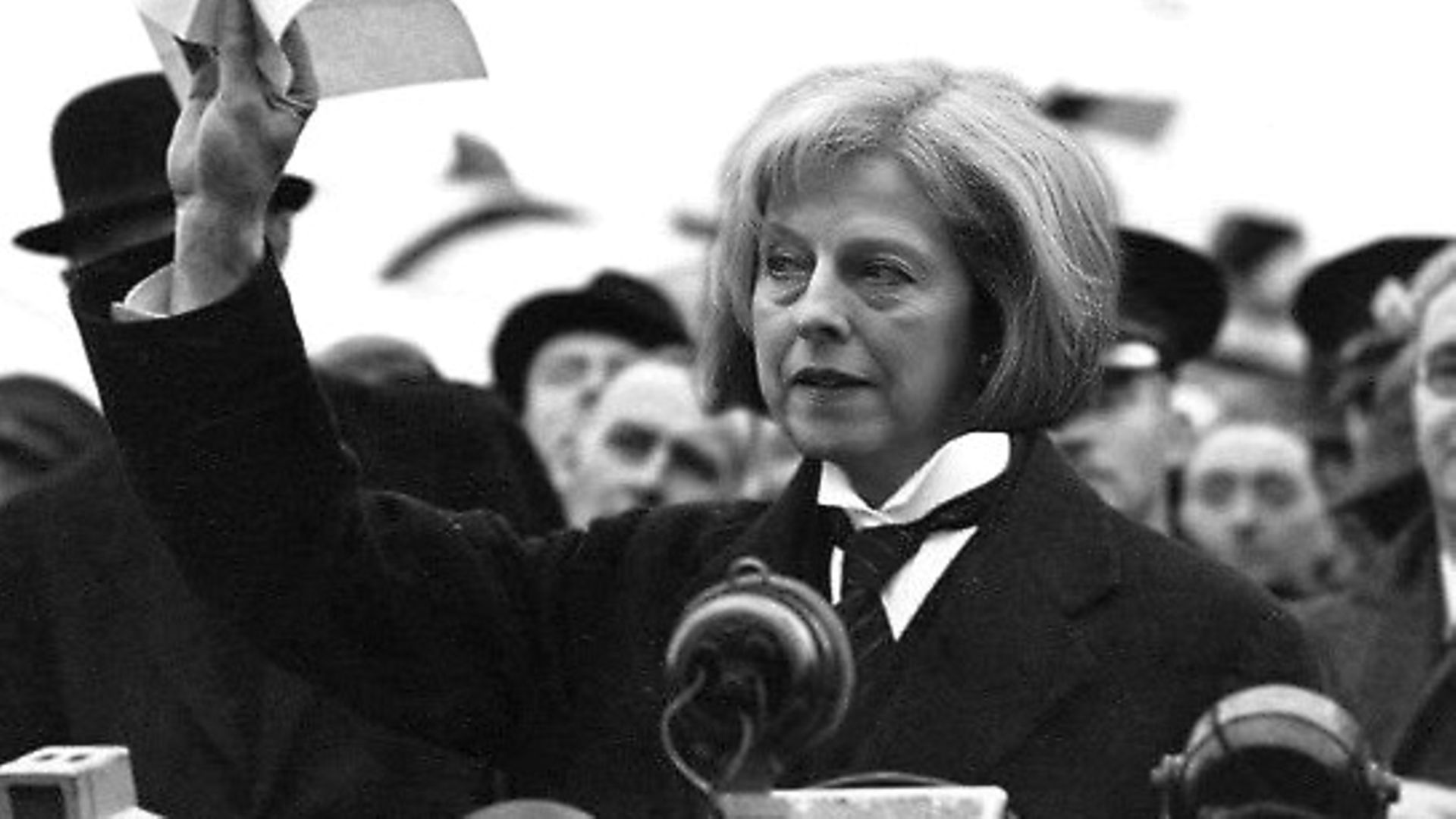
While the US press showed restraint and balance in its reporting of Theresa May’s encounter with Donald Trump, Fleet Street’s Brexit backers betrayed their – and her – growing desperation, with their fawning coverage
‘The worst thing you can possibly do in a deal is seem desperate to make it. That makes the other guy smell blood, and then you’re dead’ – Donald Trump, The Art of the Deal
Thank goodness there has been nothing desperate about Theresa May this week. The scramble to be first in a queue of none to meet President Trump, the hasty invitation for him to come and stay with the Queen, the ‘your stunning victory’ compliments: none gave the slightest whiff of Eau du Blood.
No, here we had two leaders completely in tune (if not on torture, Russia, NATO, protectionism…) walking hand-in-hand to lead the world to a better future. Theirs is a special relationship to be sure.
The British Press fell over itself to celebrate the union: ‘Love-in at the White House’, ‘Trump blesses Britain’, ‘Hand in hand the happy couple’. The Prime Minister had played a blinder. She had spoken frankly, as only friends can, on tricky issues. She had wowed the Republicans in Philadelphia. Every word was carefully chosen, every card played with precision. Who could doubt that the UK was back in the ascendant? No more back of the queue for us.
How did the American papers view all this? The New York Times responded by devoting its Saturday profile slot – ‘a weekly profile of individuals who are shaping the world around them’ – to a prominent figure in British politics: Gary Lineker. It also carried a postage stamp picture of May and Trump inset in a front-page story about Russian email hackery.
The Washington Post put a photograph of May and Trump half way down the front page with a caption saying the President had spent most of his first joint news conference with a world leader talking about himself. The report filled the top half of page three, and got round to May at the foot of the penultimate column, noting: ‘The president was more subdued than usual but still looked as though he were introducing the winner of a spelling bee. At times, as May turned to Trump, seeming to seek affirmation or at least encouragement, the president stared straight ahead, unaware of his guest’s entreaties.’
Other big-hitting American papers, such as the Boston Globe and LA Times could find no room for our lady in red on their front pages. The Murdoch-owned Wall Street Journal ran a paragraph for its US edition, but it did make May the main photograph for European readers.
Strangely, most were more interested in the Mexican wall. And John Hurt.
But May didn’t hang around to see the headlines. She had another engagement, selling weapons to Turkey, that bastion of human rights whose potential membership of the EU caused such consternation during the referendum campaign because its 79 million citizens were all packed and ready to head to Britain.
By the time she touched down, the focus was on Trump’s travel ban. Now here was our PM, the meat in a sandwich between ‘torture works’ and ‘extreme vetting’ of Muslim immigrants. On waterboarding, she said: ‘We do not sanction torture and we do not get involved in it’. On the travel ban, she declined to comment three times before saying the US was responsible for its own policy. That was eventually beefed up to an official statement from No 10 saying that she ‘did not agree’ with the move. As May pointed out in Washington, friends should speak candidly. And in a spiky Ankara press conference, her friends in Fleet Street came good.
As a result, the Sunday newspapers were still digesting the state visit and the travel ban – the tabloids were interested in a nominated film director who might not be able to attend the Oscars; the heavies gave it more, although they still preferred the potential climate change spat between Trump and Prince Charles and the president’s stair phobia.
All celebrated May’s triumph – ‘a dazzling success,’ said the Mail on Sunday; ‘Cool hand Theresa deftly twists Donald’s arm’ from the Sunday Times – and none questioned her failure to condemn the ban.
Apart from the Observer, which splashed on the ban. The paper said May’s ‘triumph, if that is what it was, will be short-lived. On issues that matter to Britain, Trump cannot be trusted’.
When Sir Mo Farah piped up to say that he might not be able to go home to his family in Oregon, and a thousand people a minute signed a petition opposing the state visit, the story moved up the agenda. Amber Rudd and Boris Johnson were ‘ordered’ to call their American counterparts to ‘demand’ an explanation. With May under pressure, her friends in the Press would surely give it to her straight? Like this:
‘Trump in climbdown over British travellers’. ‘Britons escape US travel ban’. ‘Boris keeps US open to Britons’. ‘Drug to stop Alzheimer’s’. (OK, the Express did also report the row – it wasn’t going to miss the opportunity to run photographs of the Queen and Trump). The Sun went with a lottery winner on page one, but squeezed in a tiny single headlined ‘BoJo in US win for Mo’.
So those calls from Johnson and Rudd were not protests, but special pleading. And had it even occurred to anyone in government before Sir Mo made his point so eloquently that Brits might be affected?
Far from taking May to task – did she know in advance that Trump was going to make his move (she did)? Why did she take so long to offer even the slightest criticism (even Erdogan beat her to it)? Why did she have to offer Trump a state visit when he’d been in the job only a week? – what mattered to the Press was that Brits would be seen right. Especially our expat sporting stars.
The fact is, of course, that some of those papers rather admire the policy and wish it could be imposed here. Only the Express had the guts to say as much in an piece by Leo McKinstrey and with one of its lovely phone polls to which 99% of an unspecified number of respondents said ‘yes’ to the question: ‘Should Britain bring in ‘extreme vetting’ of migrants?’
By then more than 1.5m people had signed a petition asking for the stave visit invitation to be revoked and tens of thousands were protesting about the travel ban across the UK. Johnson had to explain himself to the Commons, where Labour MP Mike Gapes picked up the Twitter trend to label the PM ‘Theresa the Appeaser’.
Time for home truths from those friends in the Press? Not a bit of it. While the dangerous Left (aka the Mirror, Guardian and i) kept the story going and The Times found a diplomat in Lord Ricketts to point out – at last – that the State visit invitation was unprecedentedly early, the pro-Brexit papers took flight. The Express comforted itself with the weather, the Mail and Telegraph led on caring for elderly parents, the Sun found a rather good sex and bribery scandal in the City. Inside they couldn’t avoid the subject, reporting the protests alongside ‘calm down, he’s not Hitler’ articles all over the place and mockery for the state visit petition. Trevor Kavanagh in the Sun advised us to ‘bask in our unexpected good fortune’ in having Trump in the White House.
With MPs gathering in the Commons for the Brexit debate that right-wing papers regarded as an affront to democracy, it might be thought that the news wave would roll on. But that would be to forget that Paul Dacre does not tolerate dissent, let alone defiance. Wednesday’s Mail was a collector’s edition, starting with its front page on ‘health tourism’, right through to the positioning of the debate coverage (pages 22-23).
There were two double page spreads on the Trump furore. The first, in true Mail style, impugning the motives of Lord Ricketts. How dare he ‘drag the Queen’ into politics – er, didn’t May do that? The second saw comments by Prince Charles on the dangers of forgetting the Holocaust as an assault on Trump. To round off the coverage there was a full page editorial comment – the surest sign of Dacre fury – peppered with references to the liberal elite and hysterical lefties and luvvies.
When the reader finally reaches the Brexit debate coverage, it is the usual impartial Mail fare, under the headline ‘They still don’t get it / Up to 100 MPs ready to reject Article 50 bill…and defy the 16m who voted to leave the EU’. Haven’t we been told countless times that it was 17m who voted to leave and that their will must not be thwarted? And that the 16m who voted to remain must be defied?
As they showed in their coverage of May’s US visit and its fallout, it’s the papers that still don’t get it.
Of course Trump will eventually make a state visit. But for now there would have been no insult in inviting him simply to come to Britain, even to have lunch with the Queen, to cement the relationship between the new leaders. He didn’t need to be offered bed and banquet at the palace in his first five minutes in office.
He was an unorthodox candidate and would inevitably be an unpredictable president. Common sense should have dictated that May should wait to see how he settled in before dashing over to kiss hands, and certainly to hold back on that invitation. The fact that she issued it in the knowledge that he was about to put into force a policy that would demonise whole populations and smear a religion shows ill-judgment, a lack of understanding of her own country – and desperation.
It was May’s behaviour, not Trump’s, that led to the petition and protests across the country. Yes, there would have been demonstrations about the travel ban, but it was the state visit invitation that brought so many more out on to the streets
And by banging her drum and demanding that we all rejoice in Trump’s perceived benevolence, the Brexit Press are doing her – and the country – no favours. Are you smelling blood yet, Donald?
Liz Gerard worked on national newspapers for 40 years. She now blogs about the output from Fleet Street at her www.sub-scribe.co.uk











